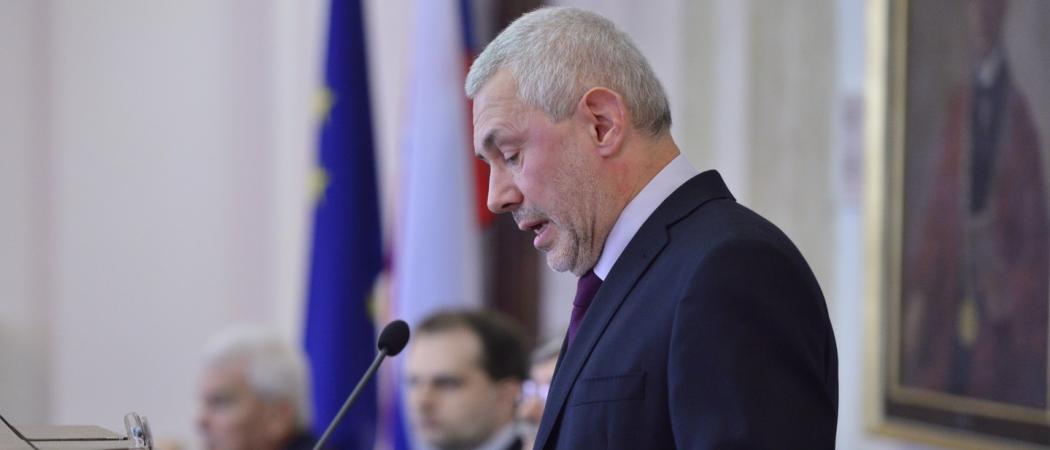Academics want to see a new system that values competition and internationalisation - and which distributes R&D money based on results and excellence

Peter Moczo, chairman of the Learned Society at the Slovak Academy of Sciences. Photo: Comenius University
Researchers and academics in Slovakia are teaming up to put pressure on government, calling for upgrades to the national research and higher education system to put more emphasis on excellence, improve the country’s performance in EU’s Horizon programme, increase international participation and stop the brain drain.
Peter Moczo, chairman of the Learned Society of Slovakia says a reform of the Slovak R&D system is long overdue. “We are really dramatically behind countries which truly support science, research and education,” Moczo told Science|Business. “The intellectual potential of Slovak science is better than is [realised] in this system and level of support.”
Slovakia does not spend a lot of money on research. According to Eurostat data, the country spends only 0.88 per cent of its GDP on R&D, and even the little it does invest is not distributed based on excellence criteria.
Researchers are also frustrated that policy makers and citizens are not aware that science and research can help Slovakia transform its economy and become more competitive internationally. The low performance “is a question of both funding and policy,” said Moczo.
In a meeting at the Slovak Technical University in November, academics agreed the country needs an “urgent” rethinking of its science, research and higher education systems. They call for a “change in approach and bold solutions.”
First on the list, the research and higher education sectors need to get organised and communicate better with policy makers, so they reach a consensus on the long-term concept of science, research, and higher education funding. “We are unable to evaluate if politicians are aware of these issues,” said Moczo.
Measuring excellence
Slovakia’s R&D system operates under a 2005 law, now seen as “obsolete” because it does not define the role of different institutions performing research and does not give particular importance to frontier research and excellence. “The law does not provide reasonable base for improving the situation in Slovakia,” said Moczo.
Academics are calling for a new system that distributes R&D money based on results and excellence, as evaluated by international panels. They say institutions failing to produce good results – visibility in high quality international publications and participation EU-funded projects – should receive less R&D funding than more successful counterparts. The national grants agency should also involve more international evaluators in their calls.
At the November meeting, Pavol Sovák, the rector of Pavol Jozef Šafárik University in Košice said "The funding of science and research should not be across-the-board, but dedicated to the ability of individual institutions to use the resources that flow to the institution in order to be in line with the Slovak or European Research Area."
Academics say a new R&D law should set up a calendar for regular international audits of Slovak research funding across universities, independent research institutes but also institutes within academy. The audits should be “a base for clear hierarchical financial support,” Moczo said.
Stopping brain drain
Like its neighbours, Slovakia is losing talented and ambitious young people at “dramatic rates,” said Moczo.
Meagre salaries force young researchers to leave for countries where there is more money available to finance their work. “If they do not have parental financial support they are pushed to leave forever or for many years to earn money and then come back,” Moczo said.
He also admitted that better salaries are not going to stop talent leaving the country, arguing that many are also disappointed with how the science system works in general and the absence of competition. “Politicians still underestimate this aspect,” he said.
In addition, Slovakia also has a poor track record in using money from EU structural funds on research. “We are really failing at state level in this aspect,” Moczo said.
‘Academic incest’
Another problem at the top of Moczo’s list of complaints is that research institutions are not sufficiently open to bringing in and working with people from outside. He calls this “academic incest”.
According to him, too many researchers get their PhD degrees and start working at same university where they completed their undergraduate studies. “This way of getting researchers should not be dominant,” he said.
In addition, universities rarely open new positions to candidates from outside. In some departments, the same people are “recycled” in leading positions “for decades,” Moczo said. In other institutions, the situation is more dire, as heads of departments are being accused of nepotism for trying to promote their children in leading positions.
“Such heads of departments simply are suppressing good potential other candidates – to create chance for his son,” Moczo said.
But solving these issues will not be possible unless research and higher education become “a priority for the Slovak government,” Pavol Šajgalík, president of the Slovak Academy of Sciences said at the November meeting in Bratislava.
To nudge his government in this direction, Moczo has started a new habit: delivering an annual address on the state of science and higher education, a nod to the long-standing tradition by the UK’s Royal Society to communicate frequently on the state of scientific research.
This year, in his second address, Moczo called for a more diverse academic community and more efforts towards international cooperation. “Slovak science cannot be improved without significant internationalisation,” he said.





 A unique international forum for public research organisations and companies to connect their external engagement with strategic interests around their R&D system.
A unique international forum for public research organisations and companies to connect their external engagement with strategic interests around their R&D system.